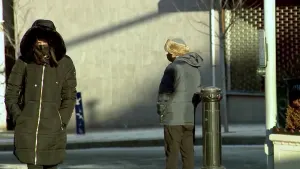More Stories
As the world learns to live with COVID-19, there is some debate as to who is best to decide how to manage the risk of the virus.
The dean of the Rutgers School of Public health says that people should be able to make the decisions for themselves.
“People are tired of being treated like children. They’re tired of being scolded,” says Dr. Perry Halkitis. “I think it’s time to flip the conversation and say, ‘We trust you to do the right thing for yourself and your family.”
For nearly two years Halkitis has supported government mask mandates, vaccine requirements and vaccine passports. But he says that it is time for these mandates to end.
“We’ve empowered people to protect their children and to protect themselves. Now it’s up to the people to make those decisions. And we can’t control people’s behavior,” he says.
COVID-19 vaccines and booster shots are readily available. Halkitis says that the virus is no longer spreading like a wildfire, the delta variant is waning and schools reopening did not produce large spikes in cases.
“Six months ago, I would have said to you, ‘No, no, no – people cannot make this choice because they could get people sick.’ I don’t believe that’s happening. We know it’s not happening with the intensity it was happening six months ago,” Halkitis says.
But Gov. Phil Murphy says that it is still too early to ease up on restrictions.
“I would love to say yes, but the numbers today are up. The hospitalizations are up,” Murphy said.
The governor said that the way to move forward is for more people to get booster shots and a third dose of the vaccine and to vaccinate more children between the ages of 5 and 11.
“I think if we get more penetration quickly of the kid’s vaccine, I hope we’ll be able to pull back on masks,” Murphy said.
Halkitis says that as long as the holidays pass with no significant spikes of COVID-19, by January it should be up to people and their families to decide what their new normal looks like.
“There's no way we're going to mandate this, so we have to allow people to make choices that they think are right for them,” he says. “It is time to say we are in a different phase. It is not time to say that it's over. It is time to say that we're going to just live with this now and we're going to manage it like we do any other disease in our mix.”
Halkitis says limited vaccine passports like those in New York City could remain in place temporarily, and end by the middle of next year.
More from News 12
1:31

What's Cooking: Uncle Giuseppe's Marketplace's prime rib roast
1:27

What's Cooking: Uncle Giuseppe's quiche lorraine
2:34

Guide: Safety tips to help prevent home burglaries
0:48

How to protect yourself against frostbite during arctic chill
2:19

Guide: Safety measures to help prevent fires and how to escape one
2:07
